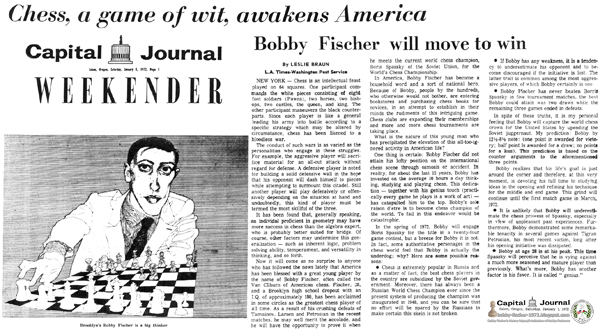The Capital Journal Salem, Oregon Saturday, January 01, 1972 - Page 31
Chess, A Game of Wit, Awakens America: Bobby Fischer Will Move To Win
By LESLIE BRAUN L.A. Times-Washington Post Service
NEW YORK — Chess is an intellectual feast played on 64 squares. One participant commands the white pieces consisting of eight foot soldiers (Pawns), two horses, two bishops, two castles, the queen, and king. The other participant maneuvers the black counter-parts. Since each player is like a general leading his army into battle according to a specific strategy which may be altered by circumstance, chess has been likened to a bloodless war.
The conduct of such wars is as varied as the personalities who engage in these struggles. For example, the aggressive player will sacrifice material for an all-out attack without regard for defense. A defensive player is noted for building a solid defensive wall in the hope that his opponent will dash himself to pieces while attempting to surmount this citadel. Still another player will play defensively or offensively depending on the situation at hand and undoubtedly, this kind of player must be termed the most skillful of the three.
It has been found that, generally speaking, an individual proficient in geometry may have more success in chess than the algebra expert, who is probably better suited for bridge. Of course, other factors may undermine this generalization — such as inherent logic, problem solving ability, temperament, and versatility in thinking, and so forth.
Now it will come as no surprise to anyone who has followed the news lately that America has been blessed with a great young player by the name of Bobby Fischer, often called the Van Cliburn of American chess. Fischer, 28, and a Brooklyn high school dropout with an I.Q. of approximately 180, has been acclaimed in some circles as the greatest chess player of all time. As a result of his crushing defeats of Tamainov, Larsen and Petrosian in the recent matches, he may well merit the accolade, and he will have the opportunity to prove it when he meets the current world chess champion, Boris Spassky of the Soviet Union, for the World's Chess Championship.
In America, Bobby Fischer has become a household word and a sort of national hero. Because of Bobby, people by the hundreds, who otherwise would not bother, are entering bookstores and purchasing chess books for novices, in an attempt to establish in their minds the rudiments of this intriguing game. Chess clubs are expanding their memberships and more and more chess tournaments are taking place.
What is the nature of this young man who has precipitated the elevation of this all-too-ignored activity in American life?
One thing is certain: Bobby Fischer did not attain his lofty position on the international chess scene through osmosis or accident. In reality, for about the last 15 years, Bobby has invested on the average 10 hours a day thinking, studying and playing chess. This dedication — together with his genius touch (practically every game he plays is a work of art) —has catapulted him to the top. Bobby's sole raison d'etre is to become chess champion of the world. To fail in this endeavor would be catastrophic.
In the spring of 1972, Bobby will engage Boris Spassky for the title in a twenty-four game contest, but a breeze for Bobby it is not. In fact, some authoritative personages in the chess world feel that Bobby is actually the underdog; why? Here are some possible reasons:
Chess is extremely popular in Russia and as a matter of fact, the best chess players in the country are subsidized by the Soviet government. Moreover, there has always been a Russian World Chess Champion ever since the present system of producing the champion was inaugurated in 1948, and you can be sure that no effort will be spared by the Russians to make certain this skein is not broken.
If Bobby has any weakness, it is a tendency to underestimate his opponent and to become discouraged if the initiative is lost. The latter trait is common among the most aggressive players, of which Bobby certainly is one.
Bobby Fischer has never beaten Boris Spassky in five tournament matches, the best Bobby could attain was two draws while the remaining three games ended in defeats.
In spite of these truths, it is my personal feeling that Bobby will capture the world chess crown for the United States by upending the Soviet juggernaut. My prediction: Bobby by 12½-8½ note: (one point is awarded for victory; half point is awarded for a draw; no points for a loss). This prediction is based on the counter arguments to the aforementioned, three points.
Bobby realizes that his life's goal is just around the corner and therefore, at this very moment, is devoting his full time to studying ideas in the opening and refining his technique for the middle and end game. This grind will continue until the first match game in March, 1972.It is unlikely that Bobby will underestimate the chess prowess of Spassky, especially in view of unpleasant past experiences. Furthermore, Bobby demonstrated some remarkable tenacity in several games against Tigran Petrosian, his most recent victim, long after his opening initiative was dissipated.
Bobby at age 28 is at his peak. This time Spassky will perceive that he is vying against a much more seasoned and mature player than previously. What's more, Bobby has another factor in his favor. It is called “genius.”

























